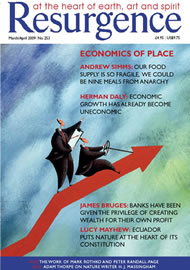The Bridge at the Edge of the World: Capitalism, the Environment, and Crossing from Crisis to Sustainability
James Gustave Speth
Yale University Press, 2008, ISBN 9780300136111
WILL HUMANITY SOMEHOW awaken with a new consciousness in time to save itself, or is a massive unnatural environmental disaster or an economic meltdown the only thing that will trigger a wake-up? That is the question on many minds today.
The increasing frequency and force of ‘unnatural’ events, combined with ever more gloomy scientific statistics and predictions, can leave us in little doubt that climate change threatens our very existence, yet the vast majority of individual responses and those of governments and corporations are minimal. We may recycle more, or use our cars less, perhaps, but we go about our business much as before. Politicians introduce weak advice and totally inadequate legislation to force us to cut CO2 emissions, and corporations promote their new eco-consumer products or trumpet their greenwash credentials.
Whether it is due to denial, disbelief, ignorance, impotence or just greed, the huge gap between what humanity is doing and what it should be doing grows ever wider. Into that space drops James Gustave Speth’s new book The Bridge at the Edge of the World,with the subtitle Capitalism, the Environment, and Crossing from Crisis to Sustainability. Speth has real credentials: a committed environmentalist since the sixties, a Yale professor, an advisor to the UN and President Carter on environmental issues and author of two other books on the subject, and much more.
Here he packs into 240 pages a wealth of information and insight on the full spectrum of the environmental, economic, political, social and psychological challenges that we face, and concludes with an impassioned plea for a new consciousness and a new politics. It is not as poetic as the works of Thomas Berry, not as confrontational as the films of Michael Moore, and not as optimistic as Paul Hawken’s Ecology of Commerce, Natural Capitalism or Blessed Unrest, to which he refers, but it is the most condensed, comprehensive and convincing book of its kind. It is the one that I would like to throw at every politician and every corporate leader.
The book opens with the powerful assertion that “all we have to do to destroy the planet’s climate and biota and leave a ruined world to our children and grandchildren is to keep doing exactly what we are doing today, with no growth in the human population or the world economy.” Of course, both are growing fast so the situation is far worse than that.
Speth goes on to make a damning critique of capitalism and its effects, which he describes as “out of control”. He points out how governments have failed to provide equitable regulatory constraints due to the power of business and the myopic desperation of both to achieve economic growth, which is environmentally unsustainable and does not deliver social satisfaction anyway.
This leads him to explore the wellbeing of people and Nature and the myth of wanting more, and of consumerism. Like Jonathon Porritt, he enumerates multiple changes that are urgently needed to fix capitalism. Is it fixable? Is it worth repairing anyway? Once it is repaired will it still be relevant or would it be better to start with a new system? Who could create a better system? These are a few of the many questions Speth’s readers will wrestle with to reach their different conclusions. In any event, he writes, “We would no longer have capitalism as we know it.” So should the eventual outcome, which will have to be radically different, still retain the name ‘capitalism’? Not in my book, for the word is forever tarnished. It has been just as destructive as communism, and perhaps more so – to the planet, at least.
The hope comes in Speth’s penultimate chapter, ‘A New Consciousness’. All conscious people – and their ranks are swelling fast – know that the only sustainable future for humanity lies in the emergence of a New Consciousness, but those people who have not experienced it yet don’t have a clue what it is. Speth describes the new consciousness well whilst avoiding the word ‘spirituality’ almost entirely. Will this book be sufficient to awaken sleeping humanity? No, but it is a comprehensive and articulate exposé of the challenges that we face, and an ideal read for those sitting on the fence – and very clarifying, reinforcing and supportive for those on the good side of the fence.
I have just attended a preview of a new film entitled The Age of Stupid. It is stunning! It goes on to reach more deeply than An Inconvenient Truth and Michael Moore’s films. Seeing that film and then reading this book would be my cure to awaken humanity. •






